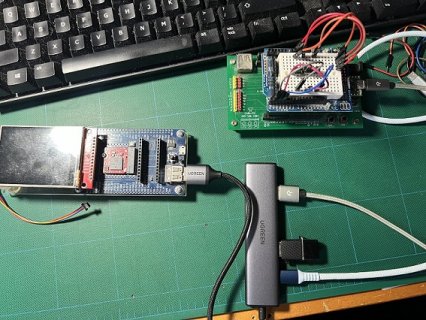=== Task() Drive 0x20005160 connected ===
>> USBDrive::startFilesystems called 0x20005160
>>Partition 1 VT:1 T:12 32 60062468
>>USBFilesystem::claimPartition 0x1 called >>USBFilesystem::check_voltype_guid(1, 0x20067fa0)
+ Claimed
Try Partition list>>USBDrive::printPartionTable
Partition Table
part,boot,bgnCHS[3],type,endCHS[3],start,length
FAT32: 1,0,0x0,0x21,0x0,0xC,0xFE,0xFF,0xFF,32,60062468
pt_#0: 2,0,0x0,0x0,0x0,0x0,0x0,0x0,0x0,0,0
pt_#0: 3,0,0x0,0x0,0x0,0x0,0x0,0x0,0x0,0,0
pt_#0: 4,0,0x0,0x0,0x0,0x0,0x0,0x0,0x0,0,0
Starting Tests
Creating /testDir...SUCCESS
Writing to /testDir/file_0.txt
Writing to /testDir/file_1.txt
Writing to /testDir/file_2.txt
Writing to /testDir/file_3.txt
Writing to /testDir/file_4.txt
Writing to /testDir/file_5.txt
Writing to /testDir/file_6.txt
Writing to /testDir/file_7.txt
Writing to /testDir/file_8.txt
Removing /testDir...SUCCESS
Test completed in 193 miliseconds.
Remove and reinsert media to test again.
MIDI Device connected
USBDrive::disconnect 0x20005160 0x20003a84
0x2000695c 0x20003a84
USBFilesystem::releasePartition 0x20003a84 called
=== Task() Drive 0x20005160 connected ===
>> USBDrive::startFilesystems called 0x20005160
>>Partition 1 VT:1 T:12 32 60062468
>>USBFilesystem::claimPartition 0x1 called >>USBFilesystem::check_voltype_guid(1, 0x20067fa0)
+ Claimed
Try Partition list>>USBDrive::printPartionTable
Partition Table
part,boot,bgnCHS[3],type,endCHS[3],start,length
FAT32: 1,0,0x0,0x21,0x0,0xC,0xFE,0xFF,0xFF,32,60062468
pt_#0: 2,0,0x0,0x0,0x0,0x0,0x0,0x0,0x0,0,0
pt_#0: 3,0,0x0,0x0,0x0,0x0,0x0,0x0,0x0,0,0
pt_#0: 4,0,0x0,0x0,0x0,0x0,0x0,0x0,0x0,0,0
Starting Tests
Creating /testDir...SUCCESS
Writing to /testDir/file_0.txt
Writing to /testDir/file_1.txt
Writing to /testDir/file_2.txt
Writing to /testDir/file_3.txt
Writing to /testDir/file_4.txt
Writing to /testDir/file_5.txt
Writing to /testDir/file_6.txt
Writing to /testDir/file_7.txt
Writing to /testDir/file_8.txt
Removing /testDir...SUCCESS
Test completed in 195 miliseconds.
Remove and reinsert media to test again.
USBDrive::disconnect 0x20005160 0x20003a84
0x2000695c 0x20003a84
USBFilesystem::releasePartition 0x20003a84 called
=== Task() Drive 0x20005160 connected ===
>> USBDrive::startFilesystems called 0x20005160
>>Partition 1 VT:1 T:12 32 60062468
>>USBFilesystem::claimPartition 0x1 called >>USBFilesystem::check_voltype_guid(1, 0x20067fa0)
+ Claimed
Try Partition list>>USBDrive::printPartionTable
Partition Table
part,boot,bgnCHS[3],type,endCHS[3],start,length
FAT32: 1,0,0x0,0x21,0x0,0xC,0xFE,0xFF,0xFF,32,60062468
pt_#0: 2,0,0x0,0x0,0x0,0x0,0x0,0x0,0x0,0,0
pt_#0: 3,0,0x0,0x0,0x0,0x0,0x0,0x0,0x0,0,0
pt_#0: 4,0,0x0,0x0,0x0,0x0,0x0,0x0,0x0,0,0
Starting Tests
Creating /testDir...SUCCESS
Writing to /testDir/file_0.txt
Writing to /testDir/file_1.txt
Writing to /testDir/file_2.txt
Writing to /testDir/file_3.txt
Writing to /testDir/file_4.txt
Writing to /testDir/file_5.txt
Writing to /testDir/file_6.txt
Writing to /testDir/file_7.txt
Writing to /testDir/file_8.txt
Removing /testDir...SUCCESS
Test completed in 196 miliseconds.
Remove and reinsert media to test again.
USBDrive::disconnect 0x20005160 0x20003a84
0x2000695c 0x20003a84
USBFilesystem::releasePartition 0x20003a84 called
=== Task() Drive 0x20005160 connected ===
>> USBDrive::startFilesystems called 0x20005160
>>Partition 1 VT:1 T:12 32 60062468
>>USBFilesystem::claimPartition 0x1 called >>USBFilesystem::check_voltype_guid(1, 0x20067fa0)
+ Claimed
Try Partition list>>USBDrive::printPartionTable
Partition Table
part,boot,bgnCHS[3],type,endCHS[3],start,length
FAT32: 1,0,0x0,0x21,0x0,0xC,0xFE,0xFF,0xFF,32,60062468
pt_#0: 2,0,0x0,0x0,0x0,0x0,0x0,0x0,0x0,0,0
pt_#0: 3,0,0x0,0x0,0x0,0x0,0x0,0x0,0x0,0,0
pt_#0: 4,0,0x0,0x0,0x0,0x0,0x0,0x0,0x0,0,0
Starting Tests
Creating /testDir...SUCCESS
Writing to /testDir/file_0.txt
Writing to /testDir/file_1.txt
Writing to /testDir/file_2.txt
Writing to /testDir/file_3.txt
Writing to /testDir/file_4.txt
Writing to /testDir/file_5.txt
Writing to /testDir/file_6.txt
Writing to /testDir/file_7.txt
Writing to /testDir/file_8.txt
Removing /testDir...SUCCESS
Test completed in 196 miliseconds.
Remove and reinsert media to test again.
Note On, ch=1, note=62, velocity=99
>>>>>>>> 1
Note Off, ch=1, note=62, velocity=0
>>>>>>>> 0
Note On, ch=1, note=62, velocity=99
>>>>>>>> 1
Note Off, ch=1, note=62, velocity=0
>>>>>>>> 0
Note On, ch=1, note=62, velocity=99
>>>>>>>> 1
Note Off, ch=1, note=62, velocity=0
>>>>>>>> 0
Note On, ch=1, note=62, velocity=99
>>>>>>>> 1
Note Off, ch=1, note=62, velocity=0
>>>>>>>> 0
USBDrive::disconnect 0x20005160 0x20003a84
0x2000695c 0x20003a84
USBFilesystem::releasePartition 0x20003a84 called
=== Task() Drive 0x20005160 connected ===
>> USBDrive::startFilesystems called 0x20005160
>>Partition 1 VT:1 T:12 32 60062468
>>USBFilesystem::claimPartition 0x1 called >>USBFilesystem::check_voltype_guid(1, 0x20067fa0)
+ Claimed
Try Partition list>>USBDrive::printPartionTable
Partition Table
part,boot,bgnCHS[3],type,endCHS[3],start,length
FAT32: 1,0,0x0,0x21,0x0,0xC,0xFE,0xFF,0xFF,32,60062468
pt_#0: 2,0,0x0,0x0,0x0,0x0,0x0,0x0,0x0,0,0
pt_#0: 3,0,0x0,0x0,0x0,0x0,0x0,0x0,0x0,0,0
pt_#0: 4,0,0x0,0x0,0x0,0x0,0x0,0x0,0x0,0,0
Starting Tests
Creating /testDir...SUCCESS
Writing to /testDir/file_0.txt
Writing to /testDir/file_1.txt
Writing to /testDir/file_2.txt
Writing to /testDir/file_3.txt
Writing to /testDir/file_4.txt
Writing to /testDir/file_5.txt
Writing to /testDir/file_6.txt
Writing to /testDir/file_7.txt
Writing to /testDir/file_8.txt
Removing /testDir...SUCCESS
Test completed in 197 miliseconds.
Remove and reinsert media to test again.


